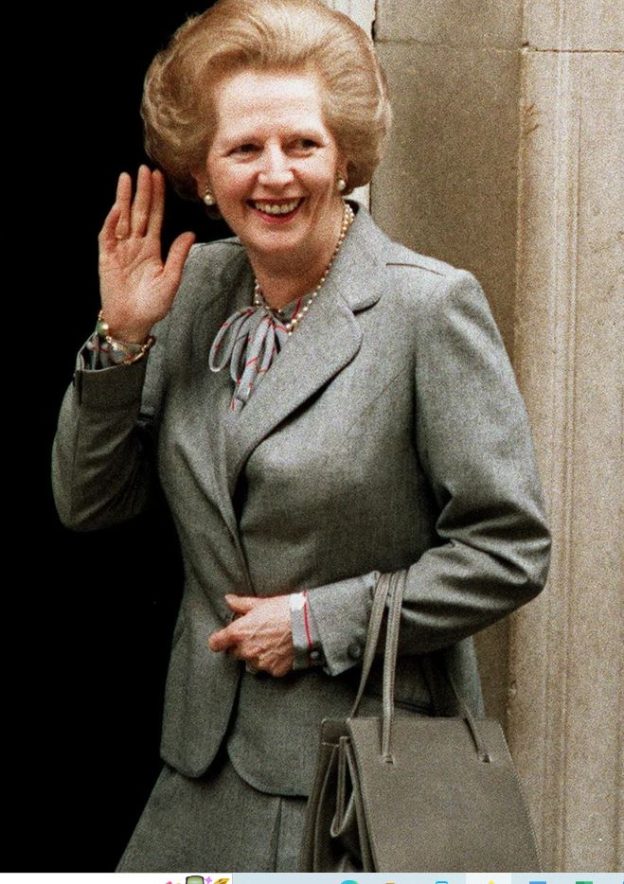©2013 By ILANA MERCER
Feminism is a form of collectivism. The sludge of feminist thought was as foreign to Margaret Thatcher’s supple mind as originality is in the collective consciousness of Dana Perino and Kimberly Guilfoyle. Big hair, an overbite, botox and mind-numbing banalities: These best describe the female hosts on Fox News’ “The Five,” a current-affairs panel, on which Lady Thatcher’s achievements were being claimed for womanhood.
To be fair to the pair from “The Five,” a procession of equally vacuous panelists, plonked on other God-awful, dual-perspective chat forums—now multiplying on TV—had all rattled on about Margaret Thatcher qua woman.
The solipsistic sorority known as feminism was alien to Mrs. Thatcher, who was a methodological individualist, if ever there was one. The “Iron Lady” would have had nothing but contempt for the mediocrities claiming her achievements for their communal sisterhood.
The causes of the late Mrs. Thatcher—who served as the United Kingdom’s prime minister from 1979 to 1990, and passed away this week—were those of “individual men and women” and their families. As Lady Thatcher famously averred, feminism was poison. “No! No! No!” The Lady was not for feminism.
Within parliament, Prime Minister Thatcher had disavowed “little sir echo’s” acquiescence to the colossal collective of the European superstate. From without parliament, she would have extended the same scorn to little miss echo’s campaigns for gender-driven sectional interests.
The force of Mrs. Thatcher’s thinking and leadership flowed from a fierce independence of mind that precluded an affinity for the black hole of feminist thought—the collapse of which becomes increasingly likely as its center of gravity grows heavier. (Yes, women—especially feminists—risk vanishing into self-centeredness and self-preoccupation.) A bona fide feminist at the Guardian got it right. Mrs. Thatcher, she fumed, had no empathy for woman-centric whining, preferring the company of men.
Such was Lady Thatcher’s individualism that she even hand-bagged Thomas Jefferson for what she perceived as his flawed expression of the American Mind:
“With all due respect to the drafters of the American Declaration of Independence, all men (and women) are not created equal, at least in regard to their characters, abilities and aptitudes,” she wrote in “Statecraft” (p. 431).
“And if they were, their family and cultural backgrounds—not to mention the effect of mere chance—would soon change that. On one thing nature and nurture agree: we are all different. If this is unjust, then life is unjust. But, though one hears this expression—usually in the form of the complaint that ‘life is unfair’—it really means nothing. In the same vein, someone once said to Voltaire, ‘Life is hard.’ To which is replied: ‘Compared with what?'” (Via Rightwing News.)
“There is no such thing as public money; there is only taxpayer’s money. Prosperity won’t come by inventing more and more lavish public expenditure programs. You don’t grow richer by ordering another checkbook from the bank. How very pleasant it would be—how very popular—to say, ‘Spend more on this, expend more on that.’ But someone has to add up the figures, every business has to do it.”
Few rivaled Mrs. Thatcher in the manly art of the parliamentary joust. By her own words, she loved “argument” and “debate.” Her opponents could not help but delight in the quickness of her retort and the richness of her idiom. During “Question Time,” in the House of Commons, a member of the Opposition informed the prime minister that he detested “every one of her domestic policies.” To which Mrs. Thatcher replied without flinching, “The honorable gentleman knows that I have the same contempt for his socialist policies as the people of East Europe who’ve experienced it have.”
Not even collectivist Nelson Mandela, the world’s secular saint, escaped Mrs. Thatcher’s astute assessment. A terrorist she called him. And so he was. The Iron Lady ventured, moreover, that grooming the African National Congress as South Africa’s government-in-waiting was tantamount to “living in cloud-cuckoo land.” Public intellectuals thought nothing of delivering South Africa into the hands of professed radical Marxist terrorists. But any one suggesting such folly to the wise Margaret Thatcher risked taking a hand-bagging.
One of my favorite Maggie moments came in 1993, as she was being grilled by the pompous Peter Mansbridge, of the Canadian Broadcasting Corporation. Mansbridge is a Canadian institution in his own right—a stuffy, if able, left-liberal journalist. Mansbridge saw fit to badger Mrs. Thatcher about “the uncompromising style of Thatcherism.”
In taking this tack with her, Mansbridge was just following his “feelings.” The liberal (feminists included), typically, detests a debate about substance, for it demands an intellectual argument. Rather, he is compelled to score silly points about style, for that sanctions his emotional approach.
Lady Thatcher’s sublime reply as to her failure to court compromise and consensus is especially poignant today, amid current popular demand for bipartisanship. Mrs. Thatcher, a master of rational argument, offered up this exquisite metaphor for the pursuit of truth:
“When you’re starting a journey over the seas, you steer by stars that are always the same in the heavens. If you haven’t any stars to steer by, then it’s a pretty nondescript journey. Consensus doesn’t seem to be a very good star to steer by.”
Baroness Thatcher then “leaned in” (the title of a dog’s breakfast of a book written by Facebook feminist Sheryl Sandberg) for the coup de grâce:
“Why are you so interested in compromise and consensus? Why are you not interested in having clear objectives—and having been elected on clear objectives, knowing full-well that the difficulties would emerge first and the benefits later?”
“Hear, Hear!”
HARD TRUTH podcast: “From Iron Lady to Party Girl – individualism vs feminism”
CATEGORIES: Britain, Conservatism, EU, Feminism, Individualism, Intelligence

 print
print